初中英语句子成分资料
初中英语句子成分

英语句子成分在英文中句子成分包括:主语、谓语、表语、宾语(直接宾语、间接宾语)、宾语补足语、定语和状语等(一)主语:主语是谓语讲述的对象,表示所说的“是什么”或“是谁”。
一般由名词、代词、不定式或相当于名词的词或短语来充当。
它在句首。
如:1. Comrade Chen is a well-known scientist.陈同志是著名的科学家。
(名词作主语)2. He reads newspapers every day .他每天读报。
(代词作主语)3. Smoking is harmful to the health .吸烟对健康有害。
(动名词作主语)(二)谓语说明主语“做什么”“是什么”或“怎么样”。
谓语(谓语部分里主要的词)必须是动词。
谓语和主语在人称和数两方面必须一致。
它在主语后面。
如:His parents are teachers .(系动词和表语一起作谓语)We study hard . (行为动词作谓语)We have finished reading the book.(助动词和行为动词一起作谓语)三)宾语宾语是动作、行为的对象,由名词、代词、不定式或相当于名词的词、短语来担任,它和及物动词一起说明主语做什么。
一般放在谓语之后。
She is doing her homework now. (名词作宾语)She said (that)she felt sick. (宾语从句做动词宾语)We often help him. (代词作宾语)He likes to play basketball.(不定式作宾语)We enjoy listening to the music.我们喜欢听音乐。
(动名词短语作宾语)说明1:宾语是及物动词涉及到的人或物。
宾语一般放在及物动词之后。
介词后面的名词或代词或动名词,称为介词宾语。
名词、代词、数词常在句中做动词宾语或介词宾语。
另外,动词不定式可做动词宾语;动名词和宾语从句也可用做动词宾语。
初中英语语法句子成分
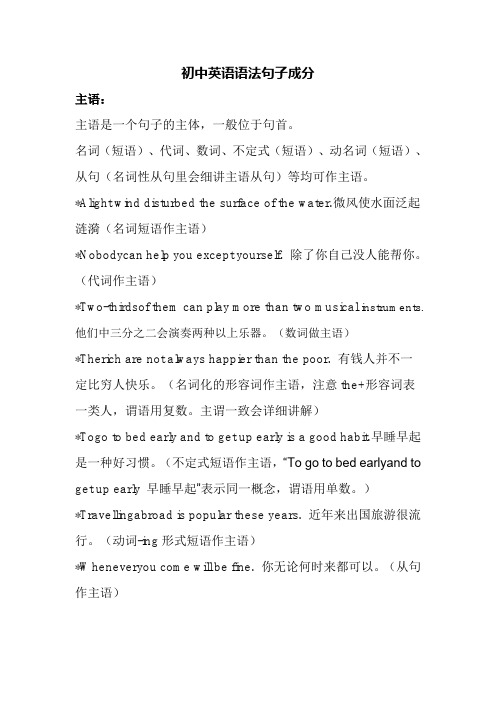
初中英语语法句子成分主语:主语是一个句子的主体,一般位于句首。
名词(短语)、代词、数词、不定式(短语)、动名词(短语)、从句(名词性从句里会细讲主语从句)等均可作主语。
*Alight wind disturbed the surface of the water.微风使水面泛起涟漪(名词短语作主语)*Nobodycan help you except yourself. 除了你自己没人能帮你。
(代词作主语)*Two-thirdsof them can play more than two musical instruments.他们中三分之二会演奏两种以上乐器。
(数词做主语)*Therich are not always happier than the poor. 有钱人并不一定比穷人快乐。
(名词化的形容词作主语,注意the+形容词表一类人,谓语用复数。
主谓一致会详细讲解)*Togo to bed early and to get up early is a good habit.早睡早起是一种好习惯。
(不定式短语作主语,“To go to bed earlyand to get up early 早睡早起”表示同一概念,谓语用单数。
)*Travellingabroad is popular these years. 近年来出国旅游很流行。
(动词-ing形式短语作主语)*Wheneveryou come will be fine. 你无论何时来都可以。
(从句作主语)谓语:用来描述主语的行为动作或所处的状态,一般位于主语之后,由动词或动词短语充当,且谓语有人称、数、时态和语态等的变化。
(详细参考“主语与动词”笔记)*Lindaworked for the company for two years.*Theold man must be sent to hospital at once.*Ihave tried this way three times.*Whathappened last night?*Iwould like to invite all my friends here.*Ourschool becomes more beautiful.宾语:1. 定义:宾语是动作的承受者,一般位于及物动词之后。
初中英语语法句子成分
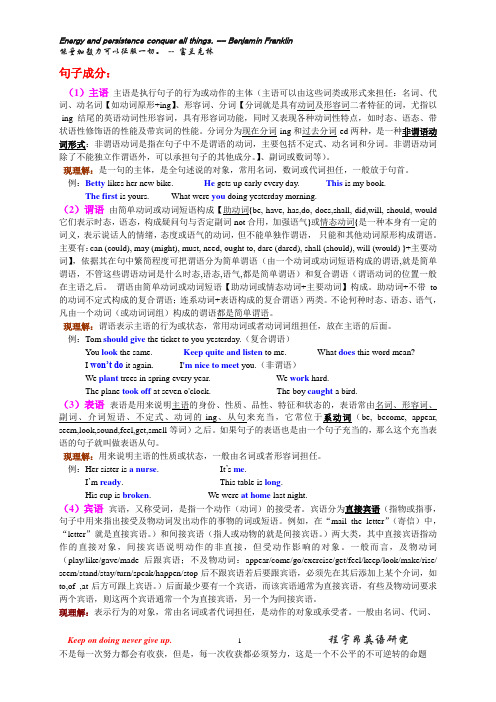
句子成分:(1)主语主语是执行句子的行为或动作的主体(主语可以由这些词类或形式来担任:名词、代词、动名词【如动词原形+ing】、形容词、分词【分词就是具有动词及形容词二者特征的词,尤指以-ing结尾的英语动词性形容词,具有形容词功能,同时又表现各种动词性特点,如时态、语态、带状语性修饰语的性能及带宾词的性能。
分词分为现在分词-ing和过去分词-ed两种,是一种非谓语动词形式:非谓语动词是指在句子中不是谓语的动词,主要包括不定式、动名词和分词。
非谓语动词除了不能独立作谓语外,可以承担句子的其他成分。
】、副词或数词等)。
现理解:是一句的主体,是全句述说的对象,常用名词,数词或代词担任,一般放于句首。
例:Betty likes her new bike. He gets up early every day. This is my book.The first is yours. What were you doing yesterday morning.(2)谓语由简单动词或动词短语构成【助动词{be, have, has,do, does,shall, did,will, should, would 它们表示时态,语态,构成疑问句与否定副词not合用,加强语气}或情态动词{是一种本身有一定的词义,表示说话人的情绪,态度或语气的动词,但不能单独作谓语,只能和其他动词原形构成谓语。
主要有:can (could), may (might), must, need, ought to, dare (dared), shall (should), will (would) }+主要动词】,依据其在句中繁简程度可把谓语分为简单谓语(由一个动词或动词短语构成的谓语,就是简单谓语,不管这些谓语动词是什么时态,语态,语气,都是简单谓语)和复合谓语(谓语动词的位置一般在主语之后。
谓语由简单动词或动词短语【助动词或情态动词+主要动词】构成。
初中英语句子成分分析

英语句子最基本句型1. 主语+谓语(谓语为不及物动词)I laugh. / He runs.2. 主语+谓语+宾语(谓语为及物动词)She likes English.3. 主语+谓语+表语(谓语为系动词)They look tired.We are students.英语句子成分讲解一、主语(subject): 句子说明的人或事物。
The sun rises in the east. (名词)He likes dancing. (代词)Seeing is believing. (动名词)Twenty years is a short time in history. (数词) To see is to believe. (不定式)What he needs is a book. (主语从句)It is very clear that the elephant is round and tall like a tree. (It形式主语,主语从句是真正主语)二、谓语(predicate):说明主语的动作、状态和特征。
谓语一般位于主语之后,谓语中最重要的部分是谓语动词,它有人称和数. 时态、语态和语气的变化,既然谓语是以动词为中心的,那么,我们研究谓语就从动词入手。
We study English. He is asleep.三、表语(predicative):系动词之后的成分,表示主语的性质、状态和特征。
He is a teacher. (名词)Seventy-four! You don’t look it. (代词)Five and five is ten. (数词)He is asleep. (形容词)His father is in. (副词)The picture is on the wall. (介词短语)My watch is gone / missing / lost. (形容词化的分词) To wear a flower is to say “I’m poor, I can’t buy a ring.” (不定式)The question is whether they will come. (表语从句) 常见的系动词有: be(is, am, are, was, were),sound(听起来),look(看起来),feel(摸起来), smell(闻起来),taste(尝、吃起来),remain(保持,仍是),feel(感觉) ….The sound sounds strange.Tom looks thin.The food smells delicious.The food tastes good.The door remains open.四、宾语:1)动作的承受者——动宾I like China. (名词)He hates you. (代词)How many do you need? We need two. (数词)We should help the old and the poor.I enjoy working with you. (动名词)I hope to see you again. (不定式) Did you write down what he said? (宾语从句)双宾语——间宾(指人)和直宾(指物)He gave me a book yesterday.Give the poor man some money.五、宾补:对宾语的补充,全称为宾语补足语。
初中英语句子成分

三、表语。 表语用以说明主语的身份、特征和状态,它一般位于系动词之后。 表语一般由名词、代词、分词、数词、不定式、动名词、介词短语、 副词及表语从句表示eg. 1、Our teacher of English is an American.(名词) 2、Is it you?(代词) 3、The weather has turned cold.(形容词) 4、The speech is exciting.(分词) 5、Three times seven is twenty one.(数词) 6、His job is to teach English.(不定式) 7、His hobby is playing football.(动名词) 8、The machine must be out of order.(介词短语) 9、Time is up.The class is over.(副词) 10、The truth is that he has never been abroad. (表语从句)
二、谓语
谓语是说明主语所做的动作或具有的特征和状态。动词在句中作谓语, 一般放在主语之后。 1、简单谓语:由一个动词或动词短语构成。 eg.He practices running every morning. 2、复合谓语: (1)由情态动词或其他助动词加动词原形构成。 eg. You may keep the book for two weeks. He has caught a bad cold. (2)由系动词加表语构成。 eg.We are students.
五、定语 定语修饰名词或代词、短语或从句。eg. 1. Guilin is a beautiful city.(形容词) 2. China is a developing country.(分词) 3. There are thirty women teachers is our school.(名词) 4. His rapid progress in English made us surprised.(代词) 5. Our monitor is always the first to enter the classroom.(不定式 短语) 6. The teaching plan for next term has been worked out.(动名词) 7. He is reading an article about how to learn English.(介词短语)
初中英语语法句子的成分
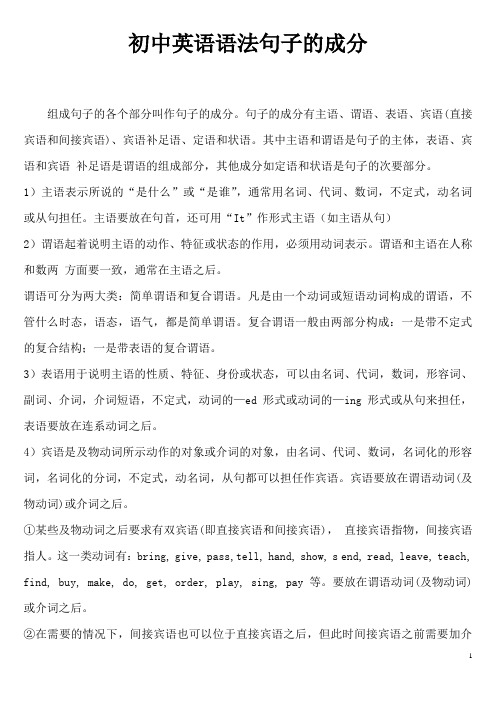
4)主语是动名词短语having a family 。
5)主语是名词Successful language learners。
6)主语是主语从句What is accepted as true 。
7)主语是动词They。
8)主语是数词4671363 。
9)主语是名词The movie 。
10)it是形式主语,真正的主语是后面的动词不定式 to be invited to your country.
8)4671363 is more easily remembered if it is chunked as 467, 13, 63.
9)The movie was said to be very interesting.
10)It’s a great honor to be invited to your country.
【特别提示】
1) 祈使句的主语(you)经常省略;如:(You)Open the door, please.
2) 动名词,不定式和从句做主语时,谓语动词为单数。如上述例句中的4、5、6。
【强化练习】
判断下列各句的主语的位置及性质:
1) Reading aloud is very important in learning a foreign language.
初中英语句子结构句子成分讲解
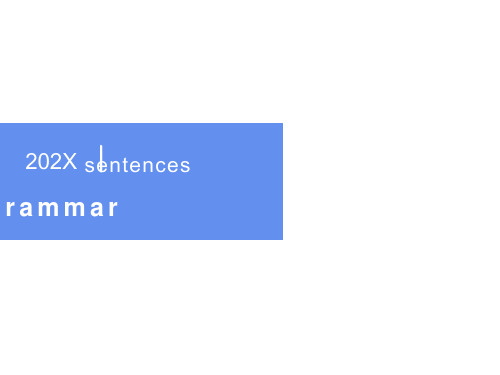
句子类型
简单句
并列句
复合句
Ⅰ.简单句
1. Things changed. 2. Trees are green. 3. We don’t beat children. 4. He gave his sister the piano. 5. I found the book easy.
常用的关联词有:as, after, before, since, till/ until, when, while, as soon as, whenever等
常用的关联词有:where, wherever, anywhere 原因状语从句 常用的关联词有:because, as, since
The train leaves at 6 o’clock.
I want a ticket.
,动词不定式,动名词 或从句
名词,主格代词
动词
3) 宾语(object)
表示vt.的动作对象或prep.所联系的对象。 由n.或相当于n.的词担任。置于vt.或prep.后。
He won the game. On the desk
6) 条件状语从句
Hale Waihona Puke 8) 方式状语从句程度状语从句 常用的关联词有:as, as if, as though, how 常用的关联词有:so, so that, as far as, so long as He did just as you told him. So long as you need me, I’ll stay.
(完整版)初中英语语法句子成分
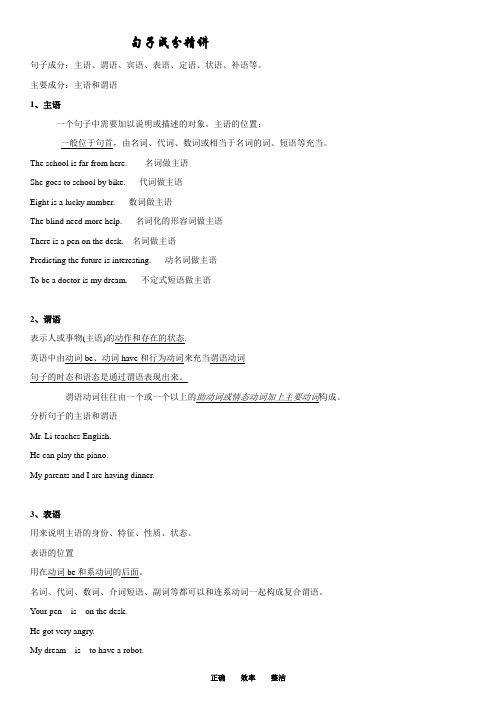
句子成分精讲句子成分:主语、谓语、宾语、表语、定语、状语、补语等。
主要成分:主语和谓语1、主语一个句子中需要加以说明或描述的对象。
主语的位置:一般位于句首,由名词、代词、数词或相当于名词的词、短语等充当。
The school is far from here. 名词做主语She goes to school by bike.代词做主语Eight is a lucky number.数词做主语The blind need more help.名词化的形容词做主语There is a pen on the desk. 名词做主语Predicting the future is interesting.动名词做主语To be a doctor is my dream.不定式短语做主语2、谓语表示人或事物(主语)的动作和存在的状态.英语中由动词be、动词have和行为动词来充当谓语动词句子的时态和语态是通过谓语表现出来。
谓语动词往往由一个或一个以上的助动词或情态动词加上主要动词构成。
分析句子的主语和谓语Mr. Li teaches English.He can play the piano.My parents and I are having dinner.3、表语用来说明主语的身份、特征、性质、状态。
表语的位置用在动词be和系动词的后面。
名词、代词、数词、介词短语、副词等都可以和连系动词一起构成复合谓语。
Your pen is on the desk.He got very angry.My dream is to have a robot.常见的系动词1. be动词2. 与感觉有关的动词look, sound, smell, taste, feel 等3. 表示状态变化的动词,意为“变得” “变成” 如get, grow, turn等上述两类词作连系动词时要用形容词作表语,千万不能用副词。
4、宾语是动作的对象或承受者。
初中英语语法句子成分
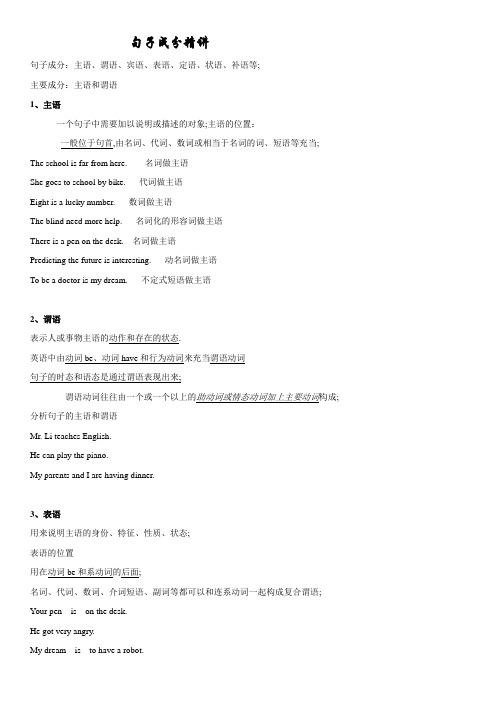
句子成分精讲句子成分:主语、谓语、宾语、表语、定语、状语、补语等;主要成分:主语和谓语1、主语一个句子中需要加以说明或描述的对象;主语的位置:一般位于句首,由名词、代词、数词或相当于名词的词、短语等充当;The school is far from here. 名词做主语She goes to school by bike.代词做主语Eight is a lucky number.数词做主语The blind need more help.名词化的形容词做主语There is a pen on the desk. 名词做主语Predicting the future is interesting.动名词做主语To be a doctor is my dream.不定式短语做主语2、谓语表示人或事物主语的动作和存在的状态.英语中由动词be、动词have和行为动词来充当谓语动词句子的时态和语态是通过谓语表现出来;谓语动词往往由一个或一个以上的助动词或情态动词加上主要动词构成; 分析句子的主语和谓语Mr. Li teaches English.He can play the piano.My parents and I are having dinner.3、表语用来说明主语的身份、特征、性质、状态;表语的位置用在动词be和系动词的后面;名词、代词、数词、介词短语、副词等都可以和连系动词一起构成复合谓语; Your pen is on the desk.He got very angry.My dream is to have a robot.常见的系动词1. be动词2. 与感觉有关的动词look, sound, smell, taste, feel 等3. 表示状态变化的动词,意为“变得” “变成” 如get, grow, turn等上述两类词作连系动词时要用形容词作表语,千万不能用副词;4、宾语是动作的对象或承受者;及物动词必须跟宾语.及物动词:直接接宾语的谓语动词.不及物动词:不能直接带宾语的谓语动词.宾语可由名词、代词、数词、不定式、动名词、从句构成.I saw a plane in the sky just now.名词做宾语I want three.数词做宾语I like going shopping.动名词做宾语We think predicting the future is hard.宾语从句5、宾语补足语宾补有些及物动词除了要有一个宾语之外, 还须加上一个补足语;如果没有补足语宾补, 有时候句子的意思就不完整; 充当宾补的有:1. 形容词作宾语补足语The sun keeps us warm.2. 介词短语作宾语补足语:I found her in the room.3. 副词作宾语补足语;Please let him in.4. 名词作宾语补足语;We made him monitor of the class.5. 动词不定式和分词也能用作宾语补足语;I asked him to come.6、定语定语修饰名词或代词即在汉语里的……的1. 形容词作定语一般放在被修饰语之前,修饰不定代词时放在后面They have a clever son.I have something important to tell you.2. 名词作定语:Is it a color film名词作定语一般用单数形式, 如:school bus,ticket office, paper flowers但也有例外,如: sports meeting, clothes shopman 和woman修饰的名词如果是复数,它们总以复数的形式作定语,如:men drivers , women doctors3. 代词作定语:This song is better than that one.4. 数词作定语:There are only thirty students in our class.带有数字的复合形容词.当复合形容词用连字号连接时,其中的名词要用单数形式.a two-day holiday a three-year-old boy5. 副词作定语放在被修饰词之后:Do you know the young man over there6. 介词短语作定语放在被修饰词之后:The students in our class like swimming.7、状语修饰动词,形容词或副词,有的修饰全句, 用以说明地点, 时间, 方式, 程度, 原因, 目的, 结果, 条件, 让步等.1. 副词作状语:The old man is walking slowly.表方式The boy is very clever.表程度2. 介词短语作状语:I have lived in Shanghai for five years.表时间3. 不定式作状语I come here to see you.表目的4. 现在分词作状语The teacher came in, holding a book in his hand. 表方式5. 状语从句We’ll go shopping if it doesn’t rain tomorrow.状语的位置1. 在一般情况下,用于句末;We like our school very much.2.为了强调状语,可以把它放在句首.I usually get up at six, but this morning I got up at eight.3. 表频度的副词通常用于句中, 如always, usually, often, hardly, never,用于行为动词前,be动词、助动词和情态动词后I usually get up early.He is often late.一些副词, 如already, once, just, soon, yet, still, nearly, almost, really, suddenly, certainly等用法相似sometimes, now可以位于句首,句中或句末only 在句中的位置比较灵活, 但位置不同, 意义也不同.The actor only sang a song.Only the actor sang a song.The actor sang only one song.两个或多个状语同时修饰时的顺序1. 地点状语在前, 时间状语在后.We will have a meeting in Room 202 tomorrow.2. 较小单位的状语在前,由小到大Mr. Li lives at 88 Chongwen Rd., Suzhou, Jiangsu.3. 一个句子有几个不同种类的副词作状语, 其顺序大都是: 程度副词,方式副词, 地点副词, 时间副词She sang very well at the meeting last night.时间和地点状语也可以位于句首, 表示强调或使上下文更为连贯Usually I read the newspapers in the morning, but yesterday I read them in the evening.动词-ed形式作定语,表语,宾语补足语和状语一、动词-ed形式作定语过去分词作定语往往与被修饰的词靠得很紧,渐渐地成为一个复合词;这种分词叫分词形容词the Participle Adjective,实际上相当于一个单纯的形容词,除表示“完成”的动作之外,还表示“被动”的意义;如:spoken English 英语口语;iced beer 冰冻啤酒;cooked food 熟食; fried chips 炸土豆条;但要注意不及物动词的过去分词常表示“完成”的动作,而不表示“被动”意义;如: boiled water开水; fallen leaves落叶; the risen sun升起的太阳等;1前置定语单个的动词-ed形式,一般放在被修饰的名词的前面,作前置定语;The excited people rushed into building. 激动的人们冲进大楼;=the people who were excitedLost time can never be found again.虚度的时光,无法挽回;=time which is lost2后置定语①少数单个动词的-ed形式,如left等,只能作后置定语;1. Everything used should be marked.所有用过的东西应该做好标记;2. Among the invited were some ladies.被邀请的人中,有些是女士;3. The books left are for my students.剩下的书是给我的学生的;②动词-ed形式短语作定语时,通常要放在被修饰的名词的后面,在意思上相当于一个定语从句;及物动词的过去分词作定语用来表示被动,可改为带被动语态的定语从句;不及物动词的过去分词仅限于单个过去分词,且不能后置则表示完成,可改为带有完成时态的定语从句;1. Is there anything planned for tonight 今晚有什么活动吗=that has been planned for tonight2. The meeting, attended by a lot of people, was a success.这次会议有很多人出席,开得很成功; =which was attended by a lot of peopledrank some boiled water =which had boiled and went on with our work.我们喝了一些开水后就继续工作;注意:这里的过去分词的逻辑主语应是被修饰的词,改为定语从句时关系代词应与之一致;二、动词-ed形式作表语过去分词作表语并无“完成”或“被动”之意,而是表示主语的状态或思想感情等;如:He looked worried after reading the letter.看完信后,他显得很忧虑;When we heard of it, we were deeply moved.当我们听到这件事时,被深深地感动了;He seemed quite delighted at the idea.听到这个想法,他似乎很高兴;常见的作表语的过去分词有:amused愉快的;broken碎了的;closed关闭的;astonished吃惊的;crowded拥挤的;experienced有经验的; delighted高兴的;lost丢失的;gone遗失的;disappointed失望的;worried担忧的;interested感兴趣的tired疲劳的pleased高兴的;satisfied满意的;surprised吃惊的; married已婚的;known著名的等等三、动词-ed形式作宾语补足语能用作宾语补足语的过去分词一般都是及物动词,表示被动意义或已完成意义,有时候两者兼而有之;作宾语补足语的过去分词与宾语有逻辑上的动宾关系,即宾语是过去分词动作的对象;She found the door broken in when she came back.她回来时发现有人破门而人;My grandfather had his old house rebuilt.我爷爷找人重修了一下他的旧房子;少数不及物动词的过去分词用作宾补时,强调动作完成后的状态.They found all the guests gone when they woke up.当他们醒来时,发现所有的客人都走了;动词-ed形式作宾语补足语的基本用法动词的-ed形式可以在“主语+谓语+宾语+宾语补足语”句型中充当宾语补足语;在这一结构中,动词-ed形式和它前面的宾语构成逻辑上的被动关系;如果这种句子改为被动语态,原来的宾语补足语变成了主语补足语;1. I must get my bike repaired.我必须请人修理自行车;宾语补足语2. The girl was found beaten black and blue.人们发现那女孩被打得青一块紫一块;主语补足语1动词-ed形式可作表示感觉和心理状态的动词的宾语补足语,这类动词包括see, hear, watch, notice, feel, find, think, suppose, consider等;We thought the game lost.我们认为球赛输了;I have never heard him spoken ill of others.我从未听过有人说他的坏话;They considered the matter settled.他们认为这问题解决了;2动词-ed形式可作使役动词的宾语补足语,这类动词包括make, get, have, keep, leave, hold等;I have my hair cut once a month.我每个月理一次发;He was trying to make himself understood.他正努力使别人听懂自己;“have+宾语+done”结构有三个含义:①请人把某事做完;She had her house repaired.她请人把屋子修好了;Where did you have your hair cut 你在哪儿理的发②遭遇某种意外情况;He had his hat blown away on his way home.在回家的路上他的帽子被吹掉了;She had her wallet stolen yesterday.昨天她的钱包被偷了;③完成某事自己也可能参与;I have had all my spelling mistakes corrected.我把所有的拼写错误都改正了;He has had one thousand yuan saved this year.他今年已存了1000元;3动词-ed形式可作表示希望、要求、命令等动词的宾语补足语,这类动词包括like,want, wish, expect, order等”这一类动词的后面作宾语补足语;He won’t like such questions di scussed at the meeting.他不喜欢在会议上讨论这样的问题;The students wish the TV serial plays continued.学生们希望电视连续剧继续播下去;4过去分词用在“with+宾语+宾补”这一结构中,过去分词与宾语之间是动宾关系;The thief was brought in with his hands tied behind his back.小偷被带进来了,双手被反绑在后面;四,过去分词作状语1.过去分词作状语表示被动或完成,但有些过去分词短语因来源于系表结构,作状语时不表动作而表状态;这样的过去分词短语常见的有: lost 迷路; seated 坐; absorbed in 全神贯注于; dressed in 穿着; tired of 厌烦等;如:Absorbed in deep thought, he didn’t hear the sound.因为沉浸在思考之中,所以他没听到那个声音;2.过去分词作状语来源于状语从句,在句中一般能作五种状语,即时间、原因、条件、让步和方式状语;如:Caught in a heavy rain, he was all wet.因为淋了一场大雨,所以他全身湿透了;Caught in a heavy rain相当于原因状语从句Because he was caught in a heavy rainGrown in rich soil, these seeds can grow fast.如果种在肥沃的土壤里,这些种子能长得很快;Grown in rich soil相当于条件状语从句If these seeds are grown in rich soil注意:①当从句的主语与主句的主语一致时,才可以把从句的主语省略,且省略掉的主语与其逻辑谓语是被动关系或如第一段中所讲的表示状态;②把状语从句改为过去分词作状语时有时还可保留连词,构成“连词+过去分词”结构作状语,即“while when, once, until, if, though等连词+过去分词”结构;如:When given a medical examination, you should keep calm.当你做体格检查时要保持镇定;Though beaten by the opposite team, the players didn’t lose heart.尽管这些球员被对方球队打败了,但他们并没有灰心;练一练I.用所给词的适当形式填空,并与A-D的汉语翻译相匹配;impress; pour; speak 1. Once ______, a word becomes a promise.2. Once ______, water cannot be taken back again.3. ______ by the beautiful scenery, I forgot to go back home in time.A.覆水难收B.流连忘返C.一言既出,驷马难追II.用所给词的适当形式填空;1. ______ see from the top of the hill, the city looks beautiful to us.2. ______ give time, he’ll make a first class tennis player.3. ______ look out of the window, I found many children playing on the playground.III.将下列句子翻译成英语;1.由于被妈妈所说的话所感动,我忍不住哭了起来;2.如果给我们一个机会,我们将给大家一个非常好的表演;3.当问到他出生在哪里时,约翰说他是纽约人;Key: I. 1. spoken; C 2. poured; A 3. Impressed; BII. 1. Seen 2. Given 3. Looking III. 1. Moved by what my mother said, I cou ldn’t help crying.2. Given a chance, we could give a good performance.3. When asked where he was born, John said he was a New Yorker划分句子成分练习题1are working on the farm now.is believingof us like Kobe Bryant very muchbecame a doctor in 1998book lying on the floor are mineit begins to raincatch the train ,I got up early yesterdayalways find her happywonders If I still study Englishletter which I received the day before yesterday was a friend of mine always work hard at English.said he didn't come.love each other.did you byewatched her daughter playing the piano.job today is to help the old.doesn't mean doing.the time I got to the station,the train had left.children bought their parents a car for the 25th anniversary of their marriage.takes me an hour to get there.答案:1They主语are working系表结构做谓语on the farm地点状语now时间状语.动词ing做主语is谓语believing 宾语of us主语like 谓语Kobe Bryant 宾语very much 程度副词状语主语became谓语a doctor 宾语in 1998 时间状语book主语lying on the floor补语are谓语mine 宾语状语it形式主语began to rain 谓语catch the train ,目的状语I主语got up 谓语early yesterday 时间状语主语always find谓语her 宾语happy 状语主语wonders 谓语if I 条件句中的主语still study条件句中的谓语English 条件句中的宾语整个条件句做主干的宾语letter主语which I received the day before yesterday定语从句was谓语a friend of mine 宾语always work hard at English;——————————————主语状语谓语状语状语2. He said he didn't come.———————————————主句主语主句谓语从句主语从句谓语love each other.——————————主谓语宾语did you bye————————宾助动词主谓watched her daughter playing the piano. —————————————————————主谓宾宾语补足语job today is to help the old.——————- ——————————主定语系动词表语doesn't mean doing.————————————主谓宾the time I got to the station,the train had left. —————————————————————————时间状语从句主句主语主句谓语children bought their parents a car for the 25th anniversary of ———————————————————————————————主语谓语间接宾语直接宾语状语their marriage.————————takes me an hour to get there.————————————————形式主语谓语宾语真正主语一. 指出下列句中主语的中心词划分句子成分练习题2① The teacher with two of his students is walking into the classroom.② There is an old man coming here.③ The useful dictionary was given by my mother last year.④ To do today's homework without the teacher's help is very difficult. 二. 选出句中谓语的中心词① I don't like the picture on the wall.A. don'tB. likeC. pictureD. wall② The days get longer and longer when summer comes.A. getB. longerC. daysD. summer③ Do you usually go to school by busA. DoB. usuallyC. goD. bus④ There will be a meeting at the library this afternoon.A. will beB. meetingC. the libraryD. afternoon⑤ Did the twins have porridge for their breakfastA. DidB. twinsC. haveD. breakfast⑥ Tom didn't do his homework yesterday.A. TomB. didn'tC. doD. his homework ⑦ What I want to tell you is this.A. wantB. to tellC. youD. is⑧ We had better send for a doctor.A. WeB. hadC. sendD. doctor⑨ He is interested in music.A. isB. interestedC. inD. music ⑩ Whom did you give my book toA. giveB. didC. whomD. book三挑出下列句中的宾语① My brother hasn't done his homework.A B C D② People all over the world speak English.A B C D③ You must pay good attention to your pronunciation.A B C D④ How many new words did you learn last classA B C D⑤ Some of the students in the school want to go swimming, how about youA B C D⑥ The old man sitting at the gate said he was ill.A B C D⑦ They made him monitor of the class.A B C D⑧ Go across the bridge and you will find the museum on the left.A B C D⑨ You will find it useful after you leave school.A B C D⑩ They didn't know who "Father Christmas" really is.A B C D四挑出下列句中的表语① The old man was feeling very tired.A B C D② Why is he worried about JimA B C D③ The leaves have turned yellow.A B C D④ Soon They all became interested in the subject.A B C D⑤ She was the first to learn about it.A B C D五挑出下列句中的定语① They use Mr. Mrs. with the family name.A B C D② What is your given nameA B C D③ On the third lap are Class 1 and Class 3.A B C D④ I am afraid some people forgot to sweep the floor.A B C D⑤ The man downstairs was trying to sleep.A B C D⑥ I am waiting for the sound of the other shoeA B C D六挑出下列句中的宾语补足语① She likes the children to read newspapers and books in the reading-room.A B C D② He asked her to take the boy out of school.A B C D③ She found it difficult to do the work.A B C D④ They call me Lily sometimes.A B C D⑤ I saw Mr. Wang get on the bus.A B C D⑥ Did you see Li Ming playing football on the playground just nowA B C D七挑出下列句中的状语① There was a big smile on her face.A B C D② Every night he heard the noise upstairs.A B C D③ He began to learn English when he was eleven.A B C D④ The man on the motorbike was travelling to fast.A B C D⑤ With the medicine box under her arm, Miss Li hurried off.A B C D⑥ She loves the library because she loves books.A B C D⑦ I am afraid that if you've lost it, you must pay for it.A B C D⑧ The students followed Uncle Wang to see the other machine.A B C D八划出句中的直接宾语和间接宾语① Please tell us a story.② My father bought a new bike for me last week.③ Mr. Li is going to teach us history next term.④ Here is a pen. Give it to Tom.⑤ Did he leave any message for me答案一① teacher ② man ③ dictionary ④ To do二① B ② A ③ C ④ A ⑤ C ⑥ C ⑦ D ⑧ C ⑨ A ⑩ A三① D ② D ③ B ④ A ⑤ B ⑥ D ⑦ C ⑧ D ⑨ A ⑩ D四①D ②B ③D ④C ⑤B五① C ② C ③ A ④ B ⑤ B ⑥ D六① C ② C ③ C ④ C ⑤ D ⑥ B七① D ② A ③ D ④ D ⑤ A ⑥ D ⑦ C ⑧ D八① us, 间接宾语a story, 直接宾语② me, 间接宾语a new bike, 直接宾语③ us, 间接宾语history, 直接宾语④ Tom, 间接宾语it, 直接宾语⑤ me, 间接宾语message, 直接宾语。
初中英语句子成分及简单句结构

初中英语句子成分及简单句结构一般认为句子成分包括主语、谓语、宾语、表语、定语、状语及补语等七种成分。
1.主语作用:说明句子的中心。
构成:名词、代词、数词、不定式、动名词主语从句。
位置:句首Betty likes her new bike.(名词)。
They usually go to school on foot. (代词)。
Two and two is four. (数词)To learn a foreign language is not easy. (动词不定式短语)Playing basketball after school is great fun. (动名词短语)That the earth runs around the sun is known to everyone. (主语从句)It is known to everyone that the earth runs around the sun. (主语从句)2.谓语作用:说明主语做什么,是什么,怎么样。
构成:实义动词、连系动词、情态动词及助动词。
情态动词和助动词不能单独充当谓语,它们必须和实义动词或系动词一起构成谓语。
实义动词包括及物动词和不及物动词,及物动词后要带宾语。
位置:位于主语之后。
They work very hard. (行为动词)Tom is a student. Tom is handsome.(系动词+表语)We can speak English very well. (情态动词+实义动词)They are playing over there. (助动词+实义动词)3.宾语作用:表示动作的对象或承受着。
构成:名词、代词、数词、动词不定式、动名词以及宾语从句。
位置:动词或介词之后Tom bought a storybook last week. (名词)----How many books do you want?----I want seven. (数词)He wanted to have a cup of tea. (动词不定式短语)He enjoys playing basketball. (动名词短语)Our teacher said that he would go there. (宾语从句)有些动词需要带两个宾语,一个是直接宾语,另一个是间接宾语。
初中英语句子的成分详表
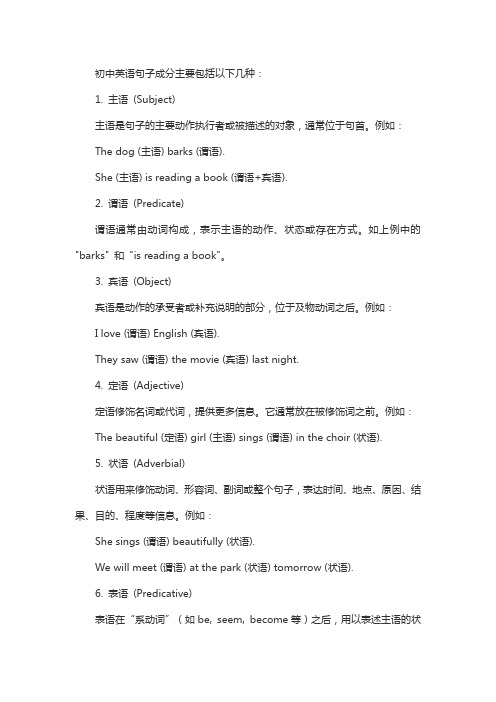
初中英语句子成分主要包括以下几种:1. 主语(Subject)主语是句子的主要动作执行者或被描述的对象,通常位于句首。
例如:The dog (主语) barks (谓语).She (主语) is reading a book (谓语+宾语).2. 谓语(Predicate)谓语通常由动词构成,表示主语的动作、状态或存在方式。
如上例中的"barks" 和"is reading a book"。
3. 宾语(Object)宾语是动作的承受者或补充说明的部分,位于及物动词之后。
例如:I love (谓语) English (宾语).They saw (谓语) the movie (宾语) last night.4. 定语(Adjective)定语修饰名词或代词,提供更多信息。
它通常放在被修饰词之前。
例如:The beautiful (定语) girl (主语) sings (谓语) in the choir (状语).5. 状语(Adverbial)状语用来修饰动词、形容词、副词或整个句子,表达时间、地点、原因、结果、目的、程度等信息。
例如:She sings (谓语) beautifully (状语).We will meet (谓语) at the park (状语) tomorrow (状语).6. 表语(Predicative)表语在“系动词”(如be, seem, become等)之后,用以表述主语的状态或特征。
例如:She (主语) is (系动词) happy (表语).7. 宾语补足语(Object Complement)用于补充说明宾语,通常出现在某些特定结构中,如使役动词后或动词make, let等后面。
例如:We elected him (宾语) our president (宾语补足语).I found the room (宾语) very comfortable (宾语补足语).8. 同位语(Appositive)同位语是对前面名词或代词的进一步解释说明,与前文形成并列关系。
初中英语语法--句子成分
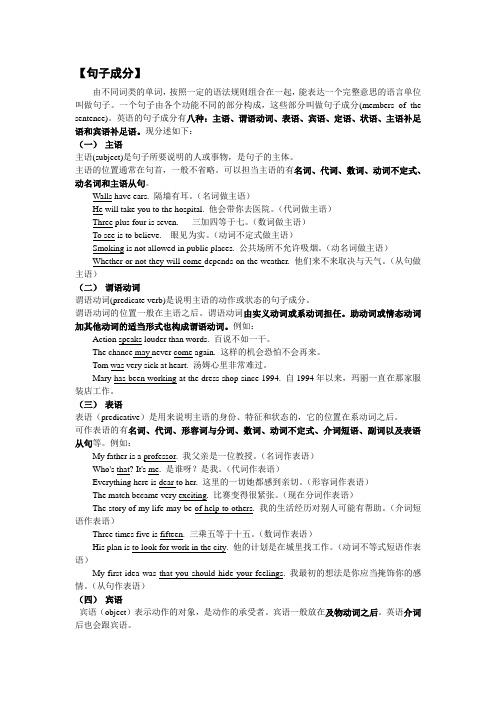
【句子成分】由不同词类的单词,按照一定的语法规则组合在一起,能表达一个完整意思的语言单位叫做句子。
一个句子由各个功能不同的部分构成,这些部分叫做句子成分(members of the sentence)。
英语的句子成分有八种:主语、谓语动词、表语、宾语、定语、状语、主语补足语和宾语补足语。
现分述如下:(一)主语主语(subject)是句子所要说明的人或事物,是句子的主体。
主语的位置通常在句首,一般不省略。
可以担当主语的有名词、代词、数词、动词不定式、动名词和主语从句。
Walls have ears. 隔墙有耳。
(名词做主语)He will take you to the hospital. 他会带你去医院。
(代词做主语)Three plus four is seven. 三加四等于七。
(数词做主语)To see is to believe. 眼见为实。
(动词不定式做主语)Smoking is not allowed in public places. 公共场所不允许吸烟。
(动名词做主语)Whether or not they will come depends on the weather. 他们来不来取决与天气。
(从句做主语)(二)谓语动词谓语动词(predicate verb)是说明主语的动作或状态的句子成分。
谓语动词的位置一般在主语之后。
谓语动词由实义动词或系动词担任。
助动词或情态动词加其他动词的适当形式也构成谓语动词。
例如:Action speaks louder than words. 百说不如一干。
The chance may never come again. 这样的机会恐怕不会再来。
Tom was very sick at heart. 汤姆心里非常难过。
Mary has been working at the dress shop since 1994. 自1994年以来,玛丽一直在那家服装店工作。
初中英语句子成分分析
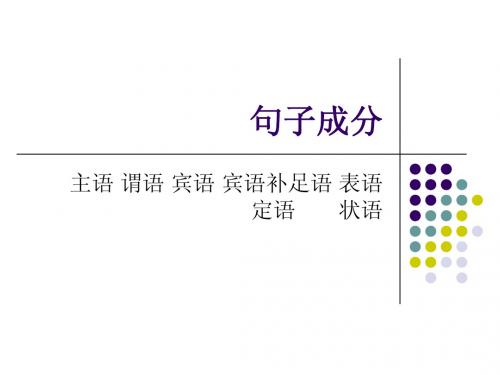
We like English very much. 我 们非常喜欢英语。 Her uncle lives in Canada. 她叔 叔住在加拿大。 She was lying in bed reading. 她躺在床上看书。
United we stand, divided we fall. 团结则存,分裂则亡
It’s an interesting story. 那是 一个有趣的故事。 Do you have time to help us? 你有时间帮助我们吗? Who is the woman being operated on? 正在动手术的 女人是谁?
状语:
用于修饰动词、形容词、副词、 短语或整个句子等的成分是状 语,修饰形容词的状语通常放 在它所修饰的词之前,修饰的 状语通常放在动词之后。但有 些副词(如:always,often等) 作状语时,则放在行为动词之 前。一般由副词、介词短语、 非谓语动词短语、名词词组、 动词不定式短语、分词短语或 状语从句充当。如
定语:
对名词或代词进行修饰、限 制或说明名词或代词的成分 是定语。单词作定语时,通 常放在他所修饰的名词之前, 但在修饰复合不定代词(如: nothing,anything, everything,something等) 时,则放在这些不定代词之 后。短语和从句作定语时, 也放在被修饰的名词之后。 一般由形容词、名词、代词、 数词、介词短语、副词、非 谓语动词、动词不定式、分 词和定语从句及句子等充当。
句子成分
主语 谓语 宾语 宾语补足语 表语 定语 状语
主语:是说明人或物,是句子的主体,一般 放在句首。名词、代词、数词常在句中作主 语。此外,动名词,动词不定式也可以作主 语。
初中英语语法句子成分

句子成分:主语、谓语、宾语、表语、定语、状语、补足语和同位语句子成分:主语、谓语、宾语、表语、定语、状语、补足语和同位语主要成分:主语和谓语主要成分:主语和谓语1、主语是动作或状态的主语。
主语的位置:一般位于句首由名词、代词、数词、动词不定式、动名词和从句充当。
由名词、代词、数词、动词不定式、动名词和从句充当。
The school is far from here. 名词做主语名词做主语She goes to school by bike. 代词做主语代词做主语Eight is a lucky number. 数词做主语数词做主语Predicting the future is interesting.动名词做主语动名词做主语To be a doctor is my dream.不定式短语做主语不定式短语做主语What we shall do next is not yet decided. 从句充当主要从句充当主要2、谓语表示主语的动作或状态. 动词由动词或动词短语充当动词由动词或动词短语充当谓语动词有人称、数、时态、语态的变化。
谓语动词有人称、数、时态、语态的变化。
分析句子的主语和谓语分析句子的主语和谓语are teachers. 系动词和表语构成谓语His parents a re teachers系动词和表语构成谓语teaches English. 行为动词做谓语Mr. Li t eaches行为动词做谓语He can play t he piano. the piano. 情态动词和行为动词构成谓语情态动词和行为动词构成谓语W e have finished reading the book. 助动词和实义动词构成谓语助动词和实义动词构成谓语3、宾语对谓语对的进一步解释说明 是动作的对象或承受者。
及物动词必须跟宾语. 对谓语对的进一步解释说明及物动词:直接接宾语的谓语动词. 不及物动词:不能直接带宾语的谓语动词. 宾语可由名词、代词、数词、不定式、动名词、从句构成. a plane in the sky just now.名词做宾语I saw a plane名词做宾语We often help him. 代词做宾语代词做宾语all. 不定式做宾语He likes t o play basketbto play basketb a ll. 不定式做宾语three.数词做宾语I want t hree数词做宾语going shopping.动名词做宾语I enjoy g oing shopping动名词做宾语He said t hat he felt sickthat he felt sick从句做宾语从句做宾语4、表语用来说明主语的身份、特征、性质、状态。
- 1、下载文档前请自行甄别文档内容的完整性,平台不提供额外的编辑、内容补充、找答案等附加服务。
- 2、"仅部分预览"的文档,不可在线预览部分如存在完整性等问题,可反馈申请退款(可完整预览的文档不适用该条件!)。
- 3、如文档侵犯您的权益,请联系客服反馈,我们会尽快为您处理(人工客服工作时间:9:00-18:30)。
1. Tom is a good boy. (名词) 2. We often speak English in class. (代词) 3. One-third of the students in this class are girls. (数词) 4. To swim in the river is a great pleasure. (不定式) 5. Smoking does harm to the health. (动名词)
7. I think (that) he is fit for this job. (宾语从 句)
双宾语(间接宾语+直接宾语),例如: Lend me your dictionary, please. =Lend your dictionary to me, please.
6. The rich should help the poor. 化形容词)
(名词
7. When we are going to have an English test has not been decided. (主语从句)
8. It is necessary to master a foreign language.(it为形式主语,真正的主语是不 定式)
7. His job is to teach English. (不定式) 8. His hobby is playing football. (动名词) 9. The machine must be out of order. (介词短语) 10. Time is up. The class is over. (副词) 11. The truth is that he has never been abroad. (表语从句)
(二)谓语Predicate:谓语说明主语所 做的动作或具有的特征和状态。说明主 语“做什么”、“是什么”或“怎么 样”,一般由动词或动词短语来充当, 一般放在主语之后。谓语和主语在人称 和数两方面必须一致。谓语的构成如下:
1.简单谓语:由一个动词或动词短语构 成。例如:
I like apples.
初中英语句子成分
句子的成分:句子的成分是指组成句子的各个部分,即:主语、谓语、 表语、宾语(直接宾语和间接宾语)、补足语、定语、状语等。 主要成分:主语 和 谓语 次要成分:表语、宾语、补足语、定语、状语 等
(一)主语Subject:主语是一个句子的主 要成分,也是句子所叙述的主体,一般 位于句首,表示句子所说的是“什么人” 或“什么事物”。
1. My mother is a doctor. (名词)
2. Is it yours?
(代词)
3. The weather has turned cold. (形容词)
4. The speech is exciting. (现在分词)
5. The door is closed. (过去分词)
6. Three times seven is twenty one. (数词)
We are having a quick breakfast.
(三) 表语Predicative:表语用于说明主语 的性质、身份、特征和状态等,说明主语 “是什么”或“怎么样”。它一般位于系 动词(如be, keep, remain, become, get. grow, turn, look, seem, feel, smell, sound, taste等)之后。表语须和连系动词一起构 成句子的复合谓语,即成系表结构。
3. How many dictionaries 数词)
4. They helped the old with their housework yesterday. (名词化形容词) 5. He pretended not to see me. (不定式) 6. I enjoy listening to popular music. (动名 词)
(四)宾语Object :宾语表示动作的对 象或承受者,一般位于及物动词和介词 后面,和及物动词一起说明主语“做什 么”,如:
1. They went to see an exhibition yesterday. (名词)
2. The heavy rain prevented me from coming to school on time. (代词)
( 动词 )
He practices running every morning. (动 词短语)
2.复合谓语:
(1)由(情态动词或其他助动词+动词原形)构成;
You may keep the book for two weeks. He has caught a bad cold.
(2)由(系动词+表语)构成。
